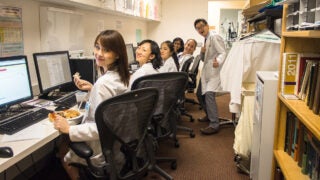
Jehni Robinson (Photo/Claire Norman)
USC doctor shares lessons learned about social justice and diversity at an early age
Jehni Robinson, chair of the Department of Family Medicine and associate dean of primary care at the Keck School of Medicine of USC, shares how deeply intertwined social justice is as a part of health for all.
When you sit down with Jehni Robinson, you can easily leave all the titles and degrees at the door. Her calm, reassuring demeanor makes your voice feel welcomed — like you’re part of something important.
Robinson — chair of the Department of Family Medicine and associate dean of Primary Care at the Keck School of Medicine of USC — is accomplished on her own. But once you hear her story, you understand why social justice is such a large part of why she is a leader, passionate about family medicine with a focus on caring for all patients and communities.
She was born in Atlanta three years after the decision in the Loving vs. Virginia case that struck down laws preventing interracial marriage in the United States. Her mother, a Swedish American, and her father, an African American, listed her race on her birth certificate as “human being.” Days after coming home, public health officials came to the family home needing to designate her mother as “white” and father as “negro” — so “they would know how to treat her in school,” Robinson said.
Growing up, other people were confused by Robinson’s identity. Living as a child of mixed race in Minneapolis, a predominantly white community was challenging.
“We are so used to putting people in boxes, and I did not clearly fit in people’s boxes, and as a result, I was very confusing to people,” Robinson said. “I didn’t really understand until later that people were struggling because we didn’t fit their stereotype of what a black person should look like. There was nothing wrong with how I looked. There was something wrong with the stereotypes that others placed on me.”
Instead, her parents built a legacy of character. Her father, James, was an attorney who worked with Martin Luther King Jr., advocating for fair housing. Her mother, Janet, a psychologist, can still be seen holding a protest sign, speaking out against injustice.
“I tell my children, ‘Half a person can’t walk through a door.’ I think you get to claim all of who you are. And I think we also have to acknowledge the diversity,” Robinson said.
“I think it’s so critical for African Americans that we also hold up how resilient, how talented, our many accomplishments and we have a lot of pride in that,” she said. “And so I always lead with that because I think it’s an important contradiction to the systemic racism that we’ve all inherited.”
For Robinson’s father, a chance meeting with Dr. King
Robinson’s father was devoted to the idea of cooperative housing, a concept similar to apartment living, but with the ability for tenants to have ownership along with a collective responsibility of keeping up the property. It was during a work trip that he sat next to King on a plane. By the time they landed, he had decided to quit his job and go to Atlanta to work with King.
“When my father passed away, I had several people from the community come up to me and say, ‘You know, you really need to understand the impact your family had on this community in terms of building neighborhoods in terms of building communities,” Robinson said.
“It was really clear the important role that housing and community play in terms of foundations for families, in order for people to be successful and have healthy, productive lives.”
Robinson is accomplished in her own right. She attended Stanford University and Morehouse School of Medicine, focused on their mission of guiding physicians to work in underserved communities.
“It has always been impressed upon me how important it was to use your career to help others, and how important it was to invest in communities,” Robinson said.
“I think throughout my life I’ve really understood more and more the legacy of slavery and how it disproportionally affected African American communities. There is much work in what we need to do to help those communities to help correct that injustice.”
In medical school, she loved everything from pediatrics to the grandmothers with their bags of medications, influencing a pursuit of family medicine that would offer her the breadth and holistic approach to caring for all patients.
A passion for urban, underserved medicine
Continuing her passion for urban, underserved medicine, she spent her residency at Harbor-UCLA Medical Center. Her career followed in community clinics, including serving as chief medical officer for the Los Angeles Free Clinic, now known as the Saban Community Clinic.
Jehni is the chair of the Department of Family Medicine and under her leadership, the merging of health and social justice has expanded. Clinical services have become more accessible, including the establishment of Keck Street Medicine. Research focuses on closing health disparities, the number of medical students matching to family medicine continues to grow, and a new Family Medicine residency is being developed helping to meet the shortage of primary care physicians.
In reference to the merging of medicine and social justice, Robinson believes that the vision and the mission of the Department of Family Medicine say it all.
“Everyone deserves access to high-quality care,” Robinson said. “It doesn’t matter where you are, where you’ve come from, or what your particular situation is right now. In our department, we want to provide that for everyone.”



